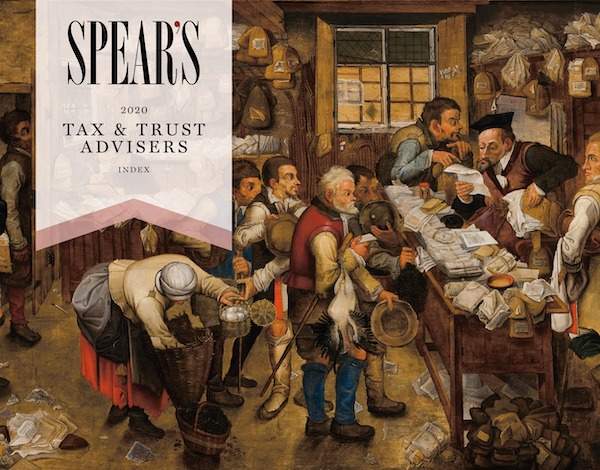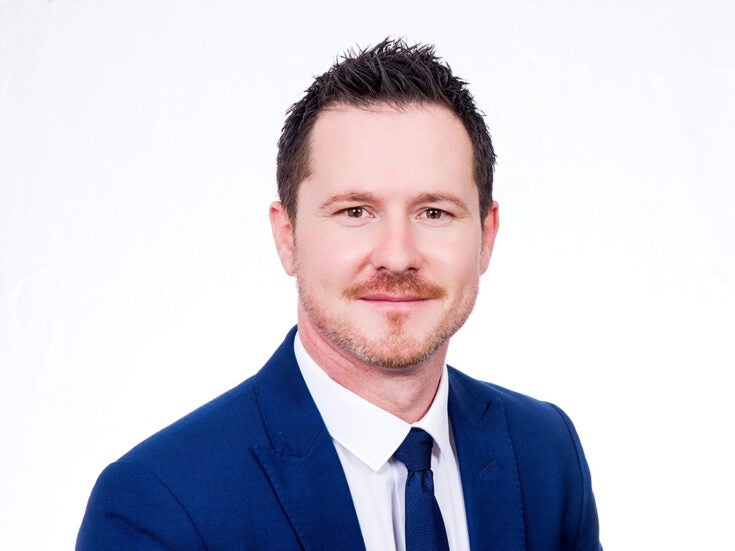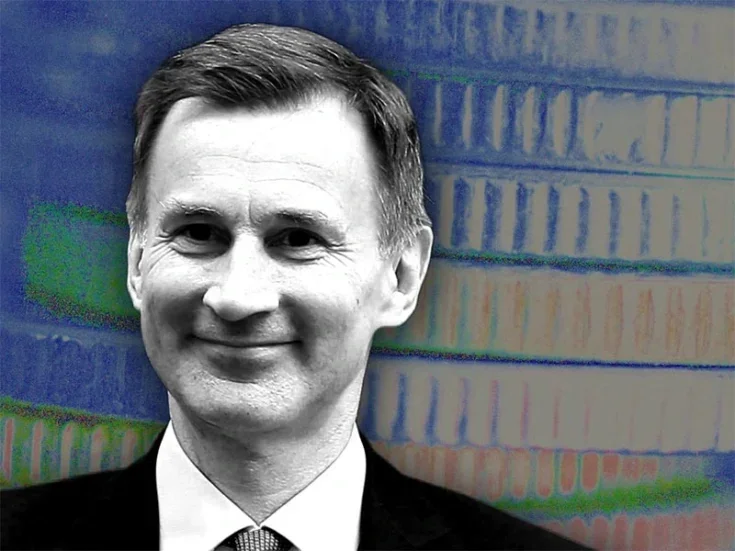
As well as Covid-19, growing international restrictions and a shifting public attitude are exercising the minds of the finest tax accountants and their high-level clients

Paul Ayres, BDO
Outstanding in field
Firm size: International
Focus: Complex structures, offshore & trusts
‘Incredibly, we managed to maintain momentum,’ Paul Ayres tells Spear’s. Despite the challenges brought on by the pandemic, his department has seen ‘an exceptional performance’ in the past 12 months.
‘This was achieved following a Herculean effort to recreate the team culture across the 300-plus members of our private client services to ensure we stayed close to our clients and key referrers.’ Ayres oversees all manner of HNW affairs for BDO as head of national private client services.
He spends the most time advising across the private client spectrum of issues, from complex structures, offshore, to trusts and wealth planning.
His clients are mainly entrepreneurs, who approach him for assurance on their tax obligations associated with everything from domicile and residence issues to real estate transactions in London. BDO’s 2019 merger with Moore Stephens made it the UK’s largest accountancy and business advisory firm focused on mid-sized, entrepreneurially spirited businesses.
Ayres’ main goal is to ‘deliver a coherent strategy’ to help his sophisticated clientele balance their complex affairs and ‘achieve their long-term personal and business goals’. Known for his lucid, approachable manner, Ayres is ‘immensely talented,’ according to one client. ‘He understands complex issues and is brilliant at listening to client needs.’

Victor Dauppe, Arram Berlyn Gardner
Outstanding in field
Firm size: International
Focus: Personal and corporate tax
Victor Dauppe has one simple purpose: to help people structure their affairs. ‘Simple’ being the optimal word: he believes that structuring has shifted over the years, from being an exercise in craftiness to leaning on a mantra of ‘straightforward, but effective’.
‘It’s all about openness, because it’s just so painful emotionally and financially to get involved in Revenue enquiries. You’re better off trying to do it right in the first place,’ he says.
He believes we are in a transitional period, and in a tax landscape where ‘the biggest worry that [he] can see is the idea that you’re going to have to explain everything’ to a ‘belligerent’ HMRC, he welcomes the ‘move to openness’.
‘The advent of DAC 6, which is the disclosure requirement for all sorts of international transactions, means that there is nowhere to hide these days. And you don’t want to hide; you want your affairs to be very open and very visible to HMRC, and that normally means making them simple.’
Coronavirus also means some more unwelcome changes. ‘We’re waiting to see exactly what the chancellor is going to pull out of the bag this winter, but everyone’s pinning their thoughts on capital gains tax at the moment,’ says Dauppe.
‘Particularly, there are rumours rushing around that they are going to take away the principal private residence exemption, which exempts the capital gains tax on the sale of your home.’

Mark Davies, Mark Davies & Associates
Outstanding in field
Firm size: Boutique
Focus: UHNW international tax problem-solving
Mark Davies has described himself as the ‘energy business’ of the offering at his eponymous firm. ‘It’s my job to energise the team to excel in our core values,’ he has previously told Spear’s.
‘We aim to be the boutique of choice for UHNWs, attracting the best talent to work with us – including staff in the management of the firm.’ Davies founded the firm in 2007 to focus on a clientele of mainly entrepreneurs and UK-resident non-doms to provide tax advice on complex structures – especially with offshore trusts and companies.
The firm has since grown into a team of specialists, many of whom are themselves non-doms. ‘We are a firm of chartered tax advisers focused exclusively on individuals, trustees and their advisers,’ he has said of the boutique.
‘Most people do not know the difference between tax planning, tax avoidance and tax evasion – and neither does the government. ‘Many of my friends criticise me because I help rich people pay less tax.
But I fundamentally believe in the rule of law and that nobody should be compelled to pay more than the law allows. So I usually describe my job as problem solving; much of my job is making sure that my clients avoid being taxed in more than one jurisdiction.’ Davies has also regularly lectured on the subjects of residence and domicile.

James Hender, Saffery Champness
Outstanding in field
Firm size: UK
Focus: Private wealth
James Hender has advised a broad client base of financial services workers and the first-generation wealthy for many years now. ‘[Clients] tend to be UK-based people; they tend to be domiciled people. It’s those high-end, wealthy families and their business interests,’ he says.
Hender says he has observed four or five years’ worth of change in the last few months because of digitisation, due in no small part to the coronavirus pandemic: ‘In terms of how we operate, how we interact with clients and how our clients want to be interacted with, we’ve speeded up.’
‘The trick is to keep delivering excellent client service in a new way,’ he adds. ‘Clients are looking to have highly efficient, costeffective compliance with leading advisory people who say, “OK, I’ve seen this before and I understand what is best for you in your circumstances.”’
Advisory services are only going to become more valuable as we exit what Hender describes as ‘a benign period for the higher earners’. For the past 30-40 years, he claims, the consensus has been to keep taxes down to encourage economic activity.
With the expenditure brought about by coronavirus, it may well be that politicians will need to tax high earners more heavily. ‘The risk there is that a lot of HNWs are very portable,’ he says, ‘so if the government puts too many taxes on, then the wealthy will vote with their feet.’

Alison Hill, PwC
Outstanding in field
Firm size: International
Focus: Complex, top-tier UHNW families
‘I’m definitely a lifer at this point in time,’ jokes Alison Hill as she describes her 22-year career at PwC. The engaging partner is at the forefront of the Big Four firm’s private client services. Hill sits in a 100-strong team that focuses on large international families and business owners who have a London nexus.
Half this team concentrates primarily on private individuals. ‘[Our structure] is increasingly to our clients’ benefit – we do cover that full spectrum. We’re not just looking after them as individuals but we can also help them look after their businesses,’ she explains. Hill herself does not have a jurisdictional focus when it comes to her practice, but has found herself working more closely with the company’s European ‘private wealth network’ in recent years.
She’s seen a ‘positive shift’ in people’s attitude to tax over the years, and has seen increased engagement between her team and HMRC which she says ultimately ‘benefits her clients’. She’s also noticed that the tax landscape is becoming more international and she is advising on a greater variety of crossborder issues.
‘As our international wealthy communities have been evolving, the industry has had to keep pace with that,’ she says.

David Kilshaw, Rawlinson & Hunter
Eminence grise
Firm size: International
Focus: Private clients, family offices
‘There is a good argument to be made that the UK tax system has completely revolutionised itself in the last ten years,’ says David Kilshaw. ‘We’ve gone from a structure that was very tax planning-focused, and we are now in a world of needing to be very cautious. So I think that’s been a big change.’
Kilshaw believes it’s vital that tax professionals are aware of the concerns that the public or the press – and clients – may have about tax and wealth structuring. However, in a world of enhanced compliance such concerns are less pressing, as offshore centres are now ‘highly regulated’ and ‘focused on doing things properly’.
‘They have an extremely professional message,’ says Kilshaw. ‘They are now marketing themselves and therefore competing on who is the most polished, when in years gone by they may have been competing around entry status.’
Other changes forecast by Kilshaw include those pertaining to non-resident capital gains tax – a symptom of the UK taxman ‘stretching his fingers across the globe’ – and non-dom rules. ‘The Revenue are increasingly looking to challenge non-dom status. People have slipped into comfort and that will need to be revisited over the next few years.’

Greg Limb, KPMG
Outstanding in field
Firm size: International
Focus: Global families
Greg Limb heads up KPMG’s private client team, where he operates in landscapes of ‘tremendous wealth creation’, with HNW clients in the Middle East, Russia, the US and Europe. Limb, who had a stint as an adviser to HMRC during his 25-plus years in tax, became a partner at KPMG in 2008, having joined in 1997.
Clients include individuals, family offices, entrepreneurs and private equity advisers, whom he advises on personal tax issues. He also advises a ‘large range’ of UK and non-UK trusts and their beneficiaries on UK tax affairs, playing an ‘instrumental’ role in the creation of many of them.
Renowned for his proactive and innovative approach to tackling tax planning, Limb focuses on ‘the ability to solve rather than create problems’. He has previously told Spear’s he is looking forward to the prospect of the ‘great wealth transfer’ to the next generation.
Rather than simplifying the complexity of the UK’s tax regulation, he is an advocate of ‘harmonising’ the rules instead: ‘We are a long way off bringing tax codes and tax rules together across jurisdictions.’ However, he hopes ‘considerable progress’ in the CRS will lead to a marked increase in global disclosures to tax authorities.

Julian Nelberg, Andersen
Outstanding in field
Firm size: International
Focus: Entrepreneurs & business owners
The fall of Arthur Andersen in 2002 forged a fresh opportunity for several partners in its private client department to capitalise on its HNW specialism. The team, made up of 23 of the former Big Five company’s top partners, formed what is now known as Andersen Tax LLC, advising top entrepreneurs, business owners and ‘the early founders of some of the really big names in Silicon Valley’. The U.S.-based firm then formed Andersen Global, an international association of independent member firms providing services under the Andersen branding. ‘It grew very, very quickly,’ Julian Nelberg tells Spear’s. ‘Its private client business is probably 20 or 30 times the size of a Big Four’s.’
Nelberg, the firm’s UK head of private client, oversees a team that is entirely dual-qualified, to be able to help the company’s US client base with UK connections and business interests. He works very closely with Miles Dean, the UK operation’s head of international tax, to offer UHNWs, senior executives and companies advice on a complete range of UK and US tax matters, including complex cross-border issues.
Prior to joining the firm in 2019 to help consolidate its UK base, Nelberg trained from 1998 at Arthur Andersen, where he spent five years, followed by five years at KPMG and then a decade at PwC.

Nicola Roberts, Deloitte
Outstanding in field
Firm size: International
Focus: Non-doms
Nicola Roberts is the highly commended head of private clients at Deloitte. She oversees a ‘big, diverse practice’ that does ‘all the things you’d expect us to do’.
‘London is the base for our international private client work,’ she says. ‘Outside of London it tends to be more domestic entrepreneurs, UHNW individuals and family offices.’
Roberts focuses on two areas. The first is UHNW international family offices; she looks after every aspect of their taxes, whether their wealth is in businesses, investments, trusts or real estate. Her other sphere is financial services.
‘We look after senior private equity partners and hedge fund owners who are invariably also international, and may also have a family office,’ she explains. ‘It’s a bit of a Venn diagram.’ Her team does considerable work on real estate. Deloitte has the biggest real estate transactions team of the Big Four and has devised an ingenious scheme to connect sophisticated buyers with deep industry expertise.
‘We’ve taken some people out of that team with their deep industry knowledge and combined them with people who work for families so we can do a “brick to bodies” surface service,’ Roberts explains.
‘I will advise on how you bring the money in and how you might structure it, and the property team advise on financial due diligence, tax due diligence, financing, all that kind of stuff.’

Suzanne Willis, Blick Rothenberg
Outstanding in field
Firm size: UK
Focus: Transatlantic clients
Blick Rothenberg partner Suzanne Willis took top honours among private client tax accountants at last year’s Spear’s Wealth Management Awards as the judges recognised the continued strength of her practice.
Willis’s previous firm, Westleton Drake, was acquired by Blick Rothenberg in 2018 as the larger business sought to benefit from its target’s US connections.
Willis, who has practised in both UK and US tax law since 1997, has told Spear’s she thinks of her clients as ‘being in the middle of the Atlantic’ because of the way that business interests and family relationships tend to take them back and forth.
As internationally mobile HNWs know only too well, this kind of lifestyle can create complexity. In some cases, problems can be dissolved before they arise – but only if clients seek advice sufficiently early. ‘A mistake clients sometimes make is to do things before taking advice. It happens all the time,’ says Willis.
‘You can get yourself in such a knot – just because you don’t understand [the implications].’ For example, a US resident moving to the UK and bringing money with them to buy a house could suddenly end up with an unexpected tax bill.
When something like this happens, Willis says, her goal is for clients to feel confident their potentially difficult situation will be dealt with properly and competently. ‘To me,’ she says, ‘that’s what it’s all about.
More from the Spear’s Tax & Trust Index:
The Spear’s Tax & Trust Advisers Index








